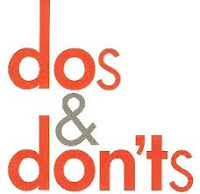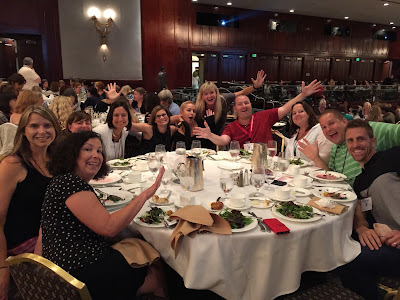Confessions of a Conference Junkie
 |
| Jerilyn Patterson |
A guest post by Jerilyn Patterson
I
became hooked on writer’s conferences after attending my first one in 2010.
Now, I attend an average of three per year, and I always look forward to the
wealth of knowledge they provide, the encouraging community, and the
opportunity to meet interesting authors and industry professionals. Over the
years I’ve honed some strategies for making the most out of my conference
experience. Read on for my tips!
Focus on Craft
First
and foremost, I go to conferences to learn. When I consider the accumulative
experience of everyone in attendance, including fellow writers as well as faculty
members, conference tuition is a steal. I try to absorb every single drop of
information and take nothing for granted.
Before
going, I reflect on the specific areas of my craft I want to improve, and then
peruse the conference schedule in search any sessions and keynotes relating to
that. While most conferences don’t require advance registration for specific break-out
sessions, I prefer to have a game-plan from the get-go, instead of leaving all
the decision-making until I’m standing in the crowded lobby of a potentially
unfamiliar place.
While
there, I take copious notes like I’m back in college and yes, everything will
be on the final exam. I read somewhere that information is best absorbed when
taking notes by hand, and I’ve found this to be true. I bring a shiny new
notebook, stock up on my favorite pens,
and keep a bottle of ibuprofen ready to
alleviate any hand cramps.
When
I get home after the conference, I type out all my notes and save them in a
file on my computer. This might seem extreme—why don’t I just use my laptop for
note-taking at the conference to eliminate the extra step? Because typing them
forces me to revisit what I’ve learned, which helps gel all that new
information. After my last conference I ended up with seventeen single-spaced pages,
and that was just for the first day! (I’m still working on transcribing day
two.)
Cultivating Community
Throughout
my years attending conferences, I’ve discovered an invaluable community that
cheers me on and buoys me up. Yet I’ll admit that’s the last thing I expected
when I stepped into my first conference. I was a brand-new, baby writer with
nothing more than an intriguing idea and a can-do attitude and I had my game
face on. My background is in music, a highly competitive field—even MORE so than
writing, believe it or not! I expected everyone in the room to size me up and
make snap judgments about my skills based on my outfit and hair-do. That had
been my experience in the music industry, and I assumed writing wouldn’t be any
different.
Nothing
was farther from the truth. Everyone I talked to was warm and welcoming. I met
new writers like myself who were eager to make friends, and veteran writers who
were incredibly generous about sharing their wealth of knowledge. I left that
conference with profound gratitude that I had finally found My People.
If
you’re attending a conference for the first time, discovering your own
community might seem daunting, especially if you’re an introvert like me. The
good news is, every single person in attendance has something in common with
you: Writing! Most will welcome the chance to talk about their latest project, their
favorite books, or how their pitch session or manuscript consultation went.
Don’t be afraid to reach out. And remember that while not everyone you
encounter will become your BFF, everyone is a colleague. The children’s writing
community is small and you never know who you’ll end up sitting with on a panel
someday.
Connecting with Professionals—AKA
Agents and Editors are people, too!
While
I value craft and community immensely, I’d be lying if I didn’t admit I also
hope to someday make a connection with my future dream agent or editor. I know
I’m not the only one—in my role as registrar for the Rocky Mountain Chapter of
SCBWI, I often receive inquiries about appropriate behavior when approaching
industry professionals.
My
first strategy is to sign up for a manuscript consultation or pitch session.
Not only do these offerings allow for an authentic reason to talk with an agent
or editor, they also provide invaluable feedback from individuals who have made
a career of selling books.
In
casual settings, my rule in approaching industry professionals is to remember they
are people too and to put myself in their shoes. Would I prefer a stranger to
walk up and start pitching out of the blue while I’m enjoying my lunch? Or
would I instead want a writer to introduce themselves respectfully and maybe even
chat about the latest Captain America
movie? Option B hands down! Sometimes the conversation will naturally progress
to what I’m working on. If not, I don’t fret and remember I’ve made a positive connection.
Or
not. There was that one time on the last day of a conference when I rode down
an elevator with a Very Big Editor from a Very Big Publishing House. Though the
editor had sat on many panels throughout the weekend, I didn’t recognize them.
Assuming the editor was a writer like me, I asked how long they’d been writing
and if this was their first conference. I received a lifted eyebrow in response,
noticed their nametag, and flushed bright red. I certainly left an impression!
If something similarly embarrassing happens to you, laugh and move on. Agents
and editors know that we’re people too.
If
you’re thinking about attending a conference, give it a try! With a little
preparation and a genuine interest in meeting and making friends with other
writers and publishing professionals, you, too, can become a conference junkie.
***Bonus update: Would you like to sit down for cocktails, conversation and a critique with Chronicle Books editor, Melissa Manlove at this year's LA16SCBWI? Following this link to learn how: Click Here
Jerilyn Patterson has been writing almost since she could talk. No joke--she dictated her first journal entry to her mother when she was four years old. Eventually she learned how to hold her own pen and years later she's still keeping a journal. She also writes young adult fiction and serves as registrar for the Rocky Mountain Chapter of SCBWI. A native of Colorado, she lives on the front range with her family and two neurotic gerbils. You can find her on twitter, (@jerwrites) occasionally tweeting about writing, legos, kickboxing or whatever else strikes her fancy.

































